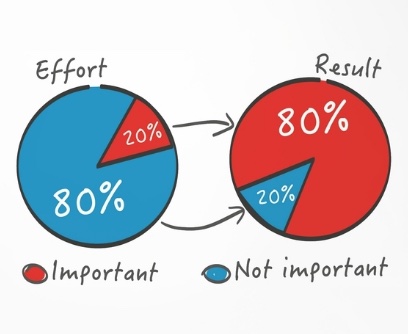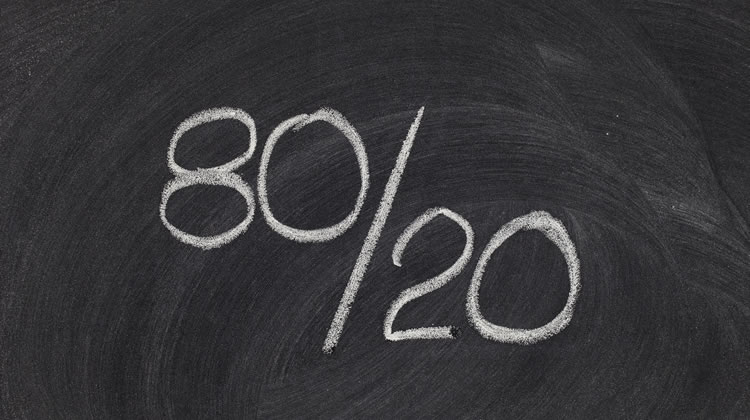Pareto principle named after renowned economist Vilfredo Pareto, specifies that that roughly 80% of effects (output) come from 20% of the causes (input), asserting an unequal relationship between inputs and outputs. In other words, almost 80% of the outcome can be achieved with 20% of your actions.

It’s commonly known as ‘The 80/20 rule‘, I call it as “Pareto Hack” when I apply this strategy to my productivity planning.
Let’s first check the truthiness of the statement. Will really doing 20% of the work is enough to achieve 80% of the result? Yes and No. We have to understand it better. The principle is about the relationship between input and output, cause and effects. For business sales, 20% of a company’s customers are responsible for 80% of the sales (only 20% loyal, repeated customers are buying 80% of the products, while the remaining 80% are just casual buyers who reason to only 20% of the sales). Also, 20% of the employees are responsible for 80% of the results. Roughly 20% of the population will contribute to 80% of the country’s wealth.
Likewise, you can see this relationship pattern between cause and effect everywhere in this world.
Even though 20% cause leads to 80% effects, this doesn’t mean any random 20% will lead to 80% output. Only selected 20%. Not any random 20% of the employee will produce 80% result in a company, Only the top-tier of high-performance employee circle does this.
The Pareto Hack is finding the 20% ’cause’ (which will bring 80% output) and acting on it while eliminating other tasks to achieve most effortlessly.

The bitter side of this principle reveals that we give more attention to tasks that don’t affect the output on a large scale. We are busy, just because, the work isn’t over yet. Why the work isn’t’ over? because you’re not focusing on the tasks that will complete the work significantly.
We are ‘busy’ doing less impactful tasks. The first task of your workflow should focus on setting priority, and the second is to focus on it for the entire day until its completion.
The biggest and usual mistakes of setting priorities are, we often choose tasks that easy for us, else which is asked of us urgently (by your higher-ups). Urgent doesn’t mean it’s important. I find people prioritize the tasks that they love or close to their heart (in name of passion). I find this odd because if it is passion, you are gonna do it anyway without much effort.
When I ask others, what is the most precious and finite resource in the world (in a productivity sense)? Everyone’s answer is “time”, some will say money, energy, skill, or talent.
Your attention is the costliest and precious resource in productivity. The ability to concentrate on one task, to keep your focus within the work in question needs will-power. So, I’d say Will Power is the most finite resource you should be used cautiously.
The Pareto hack of daily productivity is knowing where to put your finite attention and energy to yield maximum result before it depletes for the day.
Busy people always waste their precious energy doing urgent and non-impactful tasks. (I am not talking about procrastination here). Another set of people always waste their potential in doing irrelevant tasks, because they lack the ability to focus, their will-power muscle is weak.

To summarize in simple steps,
- List the tasks
- Set priority based on how much impact it will make in output.
- Ruthlessly eliminate other tasks
- Select high impactful tasks (Start with 2 tasks/day or 2 hours/day)
- Use your will power to stay focused on the most important tasks
- Do not overdo it, because you have limited will power to keep up.
Well, I opened up a window for you to explore. I’ve written few articles involving this Pareto Hack, check them out. If you liked this perception consider subscribing to the Alvistor newsletter, so you will be getting more useful ideas (weekly) to explore and implement.

One Comment